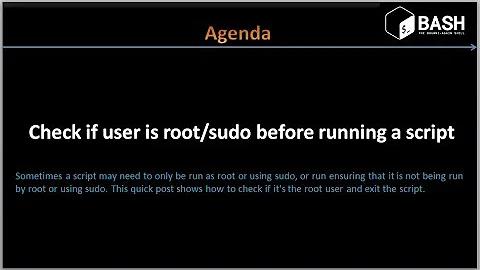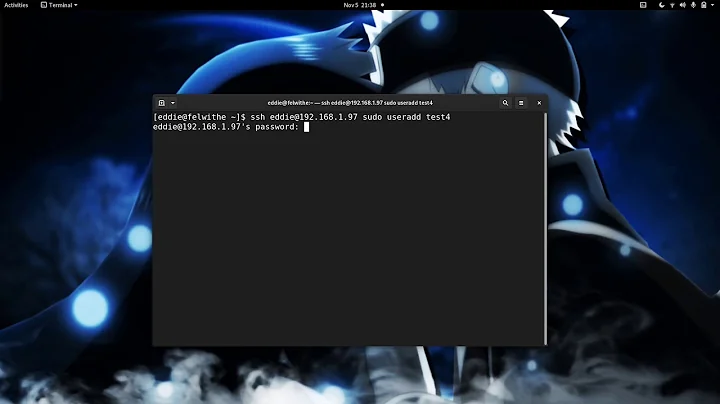SSH + Sudo + Expect in Bash script: Run command with sudo in remote machine
Solution 1
I think you missed a level of quotes escaping. At this high level of escaping, it is best to simply make a little script for every stage where otherwise quotes would be required.
Otherwise, you could try this modified version (but mind you, I don't encourage this coding style!)
function _remoteInstallation(){
local retval=1
local debToInstall=$(basename "$1")
local remoteMachine="$2"
spawned=$(expect -d -c "
set timeout 1800
spawn \"/usr/bin/ssh -t borrajax@$remoteMachine /usr/bin/sudo /usr/bin/dpkg -i /home/borrajax/Documents/$debToInstall\"
expect {
\"Are you sure you want to continue connecting\" { send \"yes\r\"; exp_continue }
\"password\" { send \"myPassword\r\"; exp_continue }
\"[sudo] password\" { send \"myPassword\r\"; exp_continue }
default { exit 1 }
}
" )
retval=$?
return $retval
}
Solution 2
Why do people always use this ugly expect stuff with ssh? Use ssh keys and you are done (read up on public key cryptography for theory, just use ssh-copy-id remotemachine once and for all for practice). Then usage is as simple as
ssh remote-machine "remote-shell-command" > local-redirection-of-command-output
As soon as you don't have to juggle between 3 levels of quoting, you will naturally write correct commands.
Related videos on Youtube
BorrajaX
Updated on September 18, 2022Comments
-
BorrajaX over 1 year
I am trying to automate the deploy of some .deb packages with an script. I want to execute
sudo dpkg -i $myDeb.debin a list of remote machines I can access with ssh.I've tried to automate the command with 'expect' inside a bash script, but I am obviously doing something wrong because I get a number of different errors (depending on where I put the quotation marks, basically)
This is the function I have (will be called with something like:
_remoteInstallation "myPackage115.deb" "192.168.1.55". I know that in the remote machine, the .deb is going to be located in $HOME/Documents/:function _remoteInstallation(){ local retval=1 local debToInstall=$(basename "$1") local remoteMachine="$2" spawned=$(expect -d -c " set timeout 1800 spawn "/usr/bin/ssh -t borrajax@$remoteMachine /usr/bin/sudo /usr/bin/dpkg -i /home/borrajax/Documents/$debToInstall"' expect { \"Are you sure you want to continue connecting\" { send \"yes\r\"; exp_continue } \"password\" { send \"myPassword\r\"; exp_continue } \"[sudo] password\" { send \"myPassword\r\"; exp_continue } default { exit 1 } } " ) retval=$? return $retval }With the quotes in the spawned area like that, I get
expect: invalid option -- 't'If I change it to:
spawn /usr/bin/ssh -t borrajax@$remoteMachine '/usr/bin/sudo /usr/bin/dpkg -i /home/borrajax/Documents/$debToInstall'It looks like is trying to run the sudo dpkg command locally (first ssh(s) to '$remoteMachine' and then runs sudo dpkg locally, like two separate commands)
With this:
spawn '/usr/bin/ssh -t borrajax@$remoteMachine \'/usr/bin/sudo /usr/bin/dpkg -i /home/borrajax/Documents/$debToInstall\''I get that
couldn't execute "'/usr/bin/ssh": no such file or directory(which is not true)... and at this point, I ran out of ideas... :-)
Any hint will be appreciated. Thank you.
-
 Admin almost 12 yearsalso posted on superuser: unix.stackexchange.com/faq#cross-posting -- don't cross-post
Admin almost 12 yearsalso posted on superuser: unix.stackexchange.com/faq#cross-posting -- don't cross-post
-
-
BorrajaX almost 12 yearsI'm afraid that's not an option in this case. I can't set my keys in the remote machines.
-
BorrajaX almost 12 yearsAlmost... It turns out that the brackets in the \"[sudo]\" option were messing it up. I finally got it working with the spawn area looking like: spawn /usr/bin/ssh -t zignage@$remoteMachine \"/usr/bin/sudo /usr/bin/dpkg -i /home/zignage/Documents/$debToInstall\" and scaping the braces in sudo (\"\[sudo\]\")




